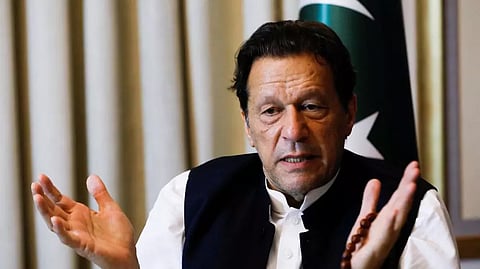

NEW DELHI: On Tuesday, the Election Commission of Pakistan (ECP) disqualified former prime minister Imran Khan from electoral politics for five years, in the aftermath of his conviction in a graft case related to gifts retained by him from the Toshakhana (state treasure house). It was just last week that an Islamabad-based district and sessions court had sentenced Khan to three years’ imprisonment on the ECP’s criminal complaint against the chief of the PTI for concealing details of the Toshakhana gifts he had retained. He was later arrested and sent to Attock jail in Punjab. The disqualification from public office implies that Khan will have to sit out the next general elections.
Political analysts have cast their doubts on the trial court’s tackling of the Toshakhana case, while highlighting the abject disregard for due process and the sidelining of democratic values through such decisions.
In fact, Khan had forecast in many interviews with foreign media outlets that he would be arrested shortly, considering the 200-odd cases against him, ranging from corruption, to terrorism and treason.
Mainstream media in Islamabad have been barred from mentioning his name in news reports. Interestingly, the development has put the former cricketer on a level turf with former PM Nawaz Sharif, who was also disqualified on a flaky corruption charge as a sitting PM in 2017, and subsequently imprisoned.
In Imran’s case, Pakistan’s army has methodically dismantled the PTI party — high profile party members have been arrested and several senior leaders have publicly distanced themselves from the party chief. A few cadre have even escaped and gone into hiding abroad. What came into sharp focus over the past few days is the eagerness of the trial court to convict Imran over the weekend, just in time before the dissolution of assemblies planned for August 9, during which a caretaker setup is said to take over. Nawaz Sharif is slated to make a comeback to campaign for his party, but the military’s sympathy lies with his younger sibling PM Shahbaz Sharif.
The election commission has also been urged to delimit constituencies based on the new census figures for Pakistan which has been pegged at 240 mn. Elections in Pakistan are to be held only post the delimitation, which could push the polls into early next year.
Imran Khan’s detention has given the Pakistani army, which has long favoured the ‘minus one’ approach to statecraft, some legroom to focus on economic stability and internal security. Earlier in July, Pakistan secured its 24th IMF intervention, having picked up a handout of $3 bn, which allows it to procure more in funding from benefactors like the UAE, Saudi Arabia and China. But Pakistan’s troubles are nowhere close to the end as its inflation rate peaked at 28.3% in July.
The spectre of terror, once harnessed by Islamabad as part of state strategy, has now come back to haunt it. The country has been beset by several terror strikes over the past few months, with outfits such as the Tehreek-e-Taliban Pakistan and the Islamic State Khorasan claiming responsibility for one dastardly attack after the other. If Islamabad’s leadership or its deep state was under the impression that getting Imran Khan into its crosshairs and out of sight was the answer to all their prayers, they might have a rude awakening in the days to come.